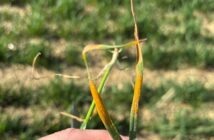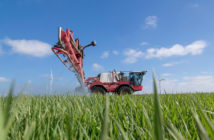Growers are taking the last opportunity to spray off and rogue bad patches of black-grass to stop the build-up of weeds next year.
Over 70% of farmers are using glyphosate to spray off black-grass with another 10% hand rouging according to an online poll from DrBlackgrass. These results match field reports coming in from across the main arable areas of England.
“This time of year is the reckoning for black-grass control,” says Ben Giles of Bayer, “Until the heads start appearing above the crop you can’t be certain how well you have controlled it. The good news is that people are using the final weeks before seed sets and becomes viable to knock out the worst patches.”
Spraying off crops so late on is a trade-off. Overall yield is lost, as well as the money invested in seed, fertiliser and crop protection but the benefit is cleaner land next year with fewer weed control headaches.
“Seed return and population size is the thing to focus on for black-grass control – bad patches don’t disappear by themselves, they get worse and spread,” says Mr Giles.
But with wheat already in ear, how can farmers avoid destroying crops so close to harvest?
This season, there is only one decision left, do I use glyphosate or not but for next year there are a wide range of options.
“Weed control for next season has already started, but there’s little point in spraying off patches unless it’s backed up with a long-term plan to cut black-grass population,” says Mr Giles.
“Now is the time to put that plan together, because seeing good wheat burnt off focuses the mind like nothing else.”
Visit www.bayercropscience.co.uk and stand at Cereals for more information on black-grass control programmes.



